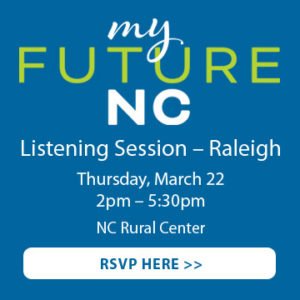 RALEIGH – Educational attainment is critical to North Carolina’s continued economic growth.
RALEIGH – Educational attainment is critical to North Carolina’s continued economic growth.
To earn a family-sustaining wage in today’s economy, North Carolinians need some postsecondary education—whether that’s a 4-year degree, an associate’s degree, a certificate or license in a career and technical field, or an apprenticeship.
The myFutureNC Commission—comprised of state leaders in education, business, philanthropy, government, and faith‐based and nonprofit communities—is reimagining ways our communities, our regions, and our state support a student’s journey, from pre-kindergarten through our community colleges and universities and into the workforce.
To help in this task, the myFutureNC Listening Tour is collecting ideas and feedback from people across the state. The Commission wants to hear from educators, parents, service providers, faith leaders, employees, employers, government representatives, and students.
The idea is to develop a statewide plan from pre-kindergarten through the university that sets clear attainment goals and benchmarks, breaks down silos and coordinates stakeholders to make the best use of North Carolina’s education resources.
UNC President Margaret Spellings discusses myFutureNC’s aims in the accompanying video.
“We’re one of just a few states in the country that don’t have an articulated postsecondary completion goal, and accordingly, a high-school attainment goal, an 8th-grade reading goal, 3rd-grade reading goal, and on and on,” Spellings says.
“That’s why we’ve convened what we’re calling myFutureNC – a commission that will look at pre-K to kindergarten, K-12 into the community colleges and university system, so that we have our act together.”
The next listening session from 2-5:30 p.m. Thursday, March 22 at the NC Rural Economic Development Center in Raleigh. RSVP here or check the schedule for future dates and locations.
The sessions are designed to hear from North Carolina communities what they perceive as their region’s economic strengths and identify education opportunities that are most needed to capitalize on those strengths.
Participants in each session will include local education, business and political leaders, as well as students and their parents. You can drop in at any time: The commission will share information about its work at 2:30 p.m., meet in small groups for discussion at 3 p.m. and host community conversations with local thought leaders at 4:15 p.m.

Leave a Reply